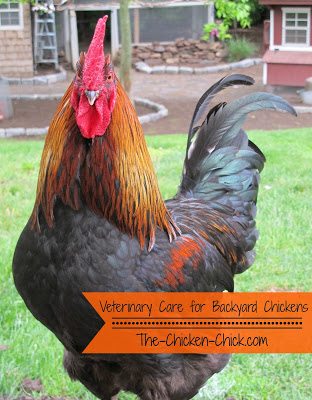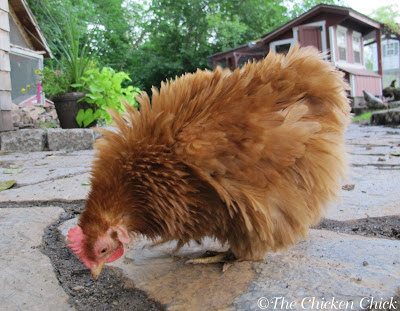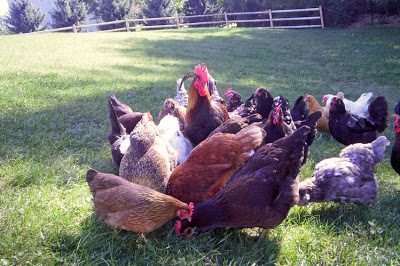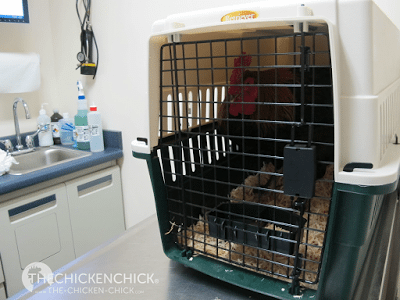After having had three extremely ill chickens in urgent need of medical care recently, it has become painfully apparent to me that finding trained medical professionals who treat backyard chickens is difficult at best. If and when we are able to find any veterinarian willing to treat chickens, we consider ourselves lucky. Once past that hurdle, we just hope that they do the right thing from a treatment perspective, knowing that most vets do not have any significant formal training in poultry care. A 2013 study published by the United States Department of Agriculture’s National Animal Health Monitoring System projecting an increase in urban backyard flocks of over 400% in the next 5 years, it is time to discuss our expectations for medical care of our chickens among ourselves and with our veterinarians.
I have had chicken-care conversations with nearly a dozen vets over the past year, one of whom emailed me last autumn with some questions about starting her own backyard flock. I mentioned the dire need for chicken veterinarians across the United States and she indicated that she “…would like to feel educated on the basics of chicken medicine.” I encouraged her to seek formal education in the field not only for her own future flock, but to help bridge the gap between sick or injured chickens and caregivers. I was heartened to know that she completed some online education this past winter.
Esther had ovarian cancer, a very common condition in older laying hens, which required putting her down. Stella was also euthanized when it was discovered that she had a severe case of egg yolk peritonitis. Both conditions were confirmed by necropsies.
After having participated in a public forum on backyard chicken-keeping recently, this particular veterinarian’s feelings were that: “chicken people complain that vets don’t know anything but they also are willing to pay nothing to have their animals taken care of properly. It’s a bad cycle of bad feelings. I hate for (animals) to suffer with a treatable problem. I could use some guidance regarding charging for treatment and an approach to dealing with the notion that vets don’t know anything about chickens.” She and I have had several discussions about veterinary care for backyard chickens. I admire her candor and willingness to discuss these issues and while I am happy to share my opinions with her, I believe these important topics ought to be discussed within and between the chicken-keeping and veterinary healthcare communities generally. Only by fleshing out these issues collaboratively, nation-wide can we eventually come to a place where we are comfortable discussing our birds’ health with our vets, comfortable with the care our chickens receive and where vets are comfortable including chicken-care as a component of their practice.
Edited to add: This subject hit the front page of The Wall Street Journal after reporter Jon Kamp contacted me to discuss an different topic, piquing his interest in the lack of trained, experienced poultry vets for backyard chickens.
I invite you to share your thoughts on some, any or all of the questions below. Please limit your comments to constructive input regarding your own thoughts, feelings and decisions you would make for your flock. Please refrain from passing judgment on the decisions another chicken-keeper may make for their flock or engaging in debate with another reader. Comments will be moderated to ensure compliance with this request for a judgment-free dialogue.
For example:
DO feel free to share that you view your chickens as livestock and if they are sick, you cull them.
DO NOT share that you believe anyone who takes their chicken to a vet is wasting their money.
Some of the issues you may wish to address are:
- Do you view your backyard chickens as livestock, pets or something else?
- Is it important to you to know that there is a veterinarian available who will treat your chicken(s)?
- Would you bring a chicken to see a vet if they did not have chicken training/experience?
- If a chicken vet practiced medicine in your community, would you bring your chickens to them for well-patient visits?
- Are you willing to pay the same exam and treatment fees for your chickens that you would pay for your cat or dog?
- Do you believe that the negligible cost of purchasing a chicken means that vets should discount their fees? If so, is that fair to the practitioner?
Please feel free to share any other thoughts you may have on the subject of chicken medical care in the comments below.
Kathy Shea Mormino
Affectionately known internationally as The Chicken Chick®, Kathy Shea Mormino shares a fun-loving, informative style to raising backyard chickens. …Read on


shop my SPONSORS
After having had three extremely ill chickens in urgent need of medical care recently, it has become painfully apparent to me that finding trained medical professionals who treat backyard chickens is difficult at best. If and when we are able to find any veterinarian willing to treat chickens, we consider ourselves lucky. Once past that hurdle, we just hope that they do the right thing from a treatment perspective, knowing that most vets do not have any significant formal training in poultry care. A 2013 study published by the United States Department of Agriculture’s National Animal Health Monitoring System projecting an increase in urban backyard flocks of over 400% in the next 5 years, it is time to discuss our expectations for medical care of our chickens among ourselves and with our veterinarians.
I have had chicken-care conversations with nearly a dozen vets over the past year, one of whom emailed me last autumn with some questions about starting her own backyard flock. I mentioned the dire need for chicken veterinarians across the United States and she indicated that she “…would like to feel educated on the basics of chicken medicine.” I encouraged her to seek formal education in the field not only for her own future flock, but to help bridge the gap between sick or injured chickens and caregivers. I was heartened to know that she completed some online education this past winter.
Esther had ovarian cancer, a very common condition in older laying hens, which required putting her down. Stella was also euthanized when it was discovered that she had a severe case of egg yolk peritonitis. Both conditions were confirmed by necropsies.
After having participated in a public forum on backyard chicken-keeping recently, this particular veterinarian’s feelings were that: “chicken people complain that vets don’t know anything but they also are willing to pay nothing to have their animals taken care of properly. It’s a bad cycle of bad feelings. I hate for (animals) to suffer with a treatable problem. I could use some guidance regarding charging for treatment and an approach to dealing with the notion that vets don’t know anything about chickens.” She and I have had several discussions about veterinary care for backyard chickens. I admire her candor and willingness to discuss these issues and while I am happy to share my opinions with her, I believe these important topics ought to be discussed within and between the chicken-keeping and veterinary healthcare communities generally. Only by fleshing out these issues collaboratively, nation-wide can we eventually come to a place where we are comfortable discussing our birds’ health with our vets, comfortable with the care our chickens receive and where vets are comfortable including chicken-care as a component of their practice.
Edited to add: This subject hit the front page of The Wall Street Journal after reporter Jon Kamp contacted me to discuss an different topic, piquing his interest in the lack of trained, experienced poultry vets for backyard chickens.
I invite you to share your thoughts on some, any or all of the questions below. Please limit your comments to constructive input regarding your own thoughts, feelings and decisions you would make for your flock. Please refrain from passing judgment on the decisions another chicken-keeper may make for their flock or engaging in debate with another reader. Comments will be moderated to ensure compliance with this request for a judgment-free dialogue.
For example:
DO feel free to share that you view your chickens as livestock and if they are sick, you cull them.
DO NOT share that you believe anyone who takes their chicken to a vet is wasting their money.
Some of the issues you may wish to address are:
- Do you view your backyard chickens as livestock, pets or something else?
- Is it important to you to know that there is a veterinarian available who will treat your chicken(s)?
- Would you bring a chicken to see a vet if they did not have chicken training/experience?
- If a chicken vet practiced medicine in your community, would you bring your chickens to them for well-patient visits?
- Are you willing to pay the same exam and treatment fees for your chickens that you would pay for your cat or dog?
- Do you believe that the negligible cost of purchasing a chicken means that vets should discount their fees? If so, is that fair to the practitioner?
Please feel free to share any other thoughts you may have on the subject of chicken medical care in the comments below.

































I am battling with a sick chicken now and I can’t figure out what is wrong. I have had her in the house for over 2 days. I thought she was egg bound, but she laid an egg yesterday and is in worse shape today. I don’t think it is a coincidence that I had two hens disappear on the same day that she got sick. They free range and I think they may have gotten into something. My guess is that the other two either died quickly, or they are hiding somewhere going through the same struggles, but without… Read more »
I lost my favorite hen yesterday. Felt so helpless because there wasn’t a vet in the area that I could bring her to. I would pay nearly the same amount for vet care for my chickens as I would for my cats or dog. I live in South central Minnesota.
I have a 3 month old Buckeye chicken who I have had separated from the rest of the flock for a few weeks. I was treating her for “pasty butt”. The breeder told me to wash her bottom once a day and put Oregano, Thyme and Basil in her water. She doesn’t seem much better. After some additional on-line research (cringe, cringe) I think she may have Vent Gleet – and I’ve applied an anti-fungal cream to her bottom and put apple cider vinegar in her water for the past two days. Any advice for me?
Hello, my little cock has his head tilted to foot, and i dont know what to do.
Can you help me. And i live in little country Estonia, i dont think here is veterinarian for chickens.
Hi there! I totally agree – it as been frustrating that I have not been able to find a medical professional that I can bring my chickens too, or at least ask questions. So I wanted to bring some questions to YOU, if folks don’t mind. We have a flock of 11 hens and 1 rooster, and one of our cuckoo marans was attacked on Monday by our dog. Luckily, she didn’t really know what to do with the chicken once she caught her, and I got in between them in time to get Sybil out of harms way. I… Read more »